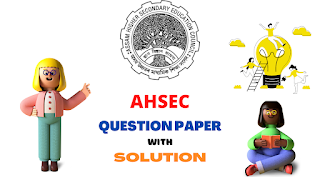AHSEC| CLASS 11| EDUCATION| SOLVED PAPER - 2017| H.S.1ST YEAR
2017
EDUCATION
Full Marks – 100
Time: 3 hours
The figures in the margin indicate full marks for the questions
1. Give appropriate answer as directed: 1x12=12
a) “Education is the manifestation of perfection already in man.” Who said this?
Ans:- Swami Vivekananda.
b) Who wrote the book, ‘Emile’?
Ans:- Jean-Jacques Rousseau.
c) Extrovertism is the characteristic of infancy period. [Write True or False]
d) In which year was the University Grants Commission constituted?
Ans:- In 1956.
e) Education has no relation to Biology. [Write True or False]
f) Write the full form of NCERT.
Ans:- The National Council of Educational Research and Training.
g) Johann Herbart is considered as the father of Educational psychology. [Fill in the blank]
h) What is the other name of ‘Monitorial system’?
Ans:- Lancasterian system.
i) Name the famous educationist who laid stress on the training of sense organ for child education.
Ans:- Roussseau.
j) Who claimed for compulsory primary education during the British rule in India?
Ans:- Gopal Krishna Gokhle.
k) Emotion is an agitated state of mind. [Write True or False]
l) Mention one limitation of computer.
Ans:- Computers are very expensive.
2. Answer the following questions: 2x12=24
a) Mention two objectives of pre-primary education.
Ans:- Two objectives of pre-primary education:-
The general objectives of pre-primary education are outlined in the law governing basic education.
The purpose of pre-primary education is to develop children into morally responsible members of humanity and society and provide them with the necessary knowledge and skills in life.
b) Write two major characteristics of non-formal education.
Ans:- Two main features of non-formal education: -
(i) Non-formal education is open-ended and non-competitive.
(ii) Non-formal education is structured and planned but outside the field of formal education.
c) Write two differences between formal and informal education.
Ans:- Two differences between formal and non-formal education: -
(i) Formal education is organized for teaching. Non-formal education is organized for learning by themselves or by group.
(ii) The formal school is a full-time institution. Non-formal education is part-time.
d) Mention two major parts of a computer.
Ans:- Two major parts of a computer:-
(i) Input equipment.
(ii) Output equipment.
e) Write two characteristics of instinct.
Ans:- Two characteristics of the profession: -
(i) The instinct is purely and uniquely indigenous, distinct from acquired modes of behavior.
(ii) Spontaneous behavior is not strange for a person but is done by all members of a group.
EDUCATION SOLVED PAPERS PAGE LINK - Click here
BUY E-BOOK (PDF FILE)
[TO SEE FULL SOLUTION]
(Chapter wise Notes, Exam Question Papers solved, MCQ solved) [ARTS, COMMERCE, SCIENCE]
|
DOWNLOAD [PAGE LINK:-CLICK HERE] |
AHSEC PAGE LINK - CLICK HERE
Also Read:

